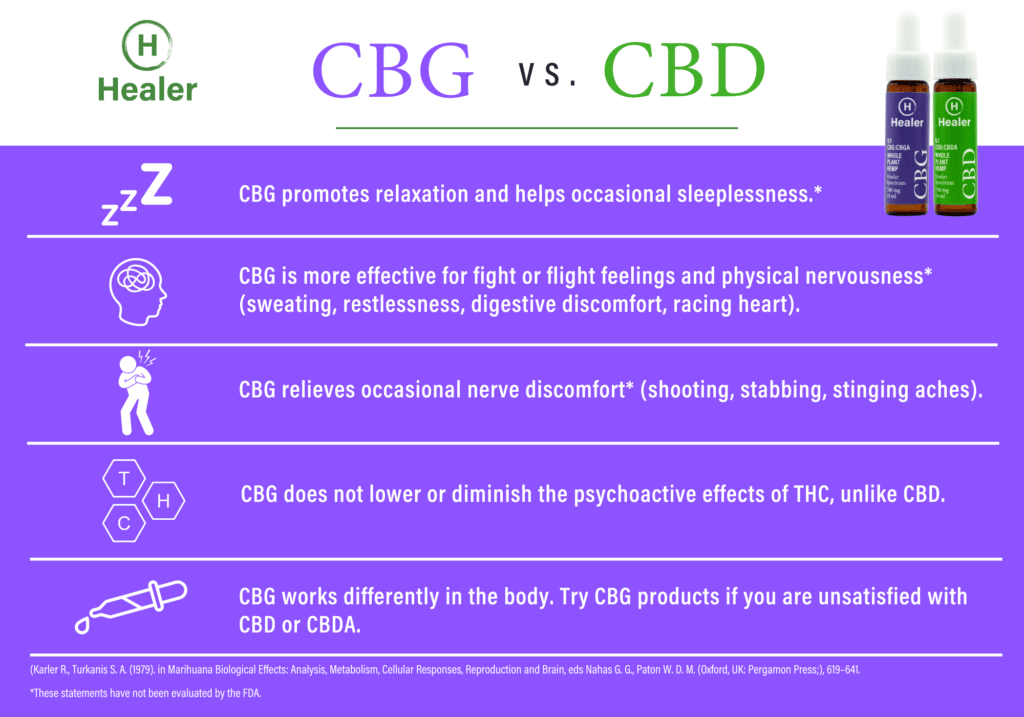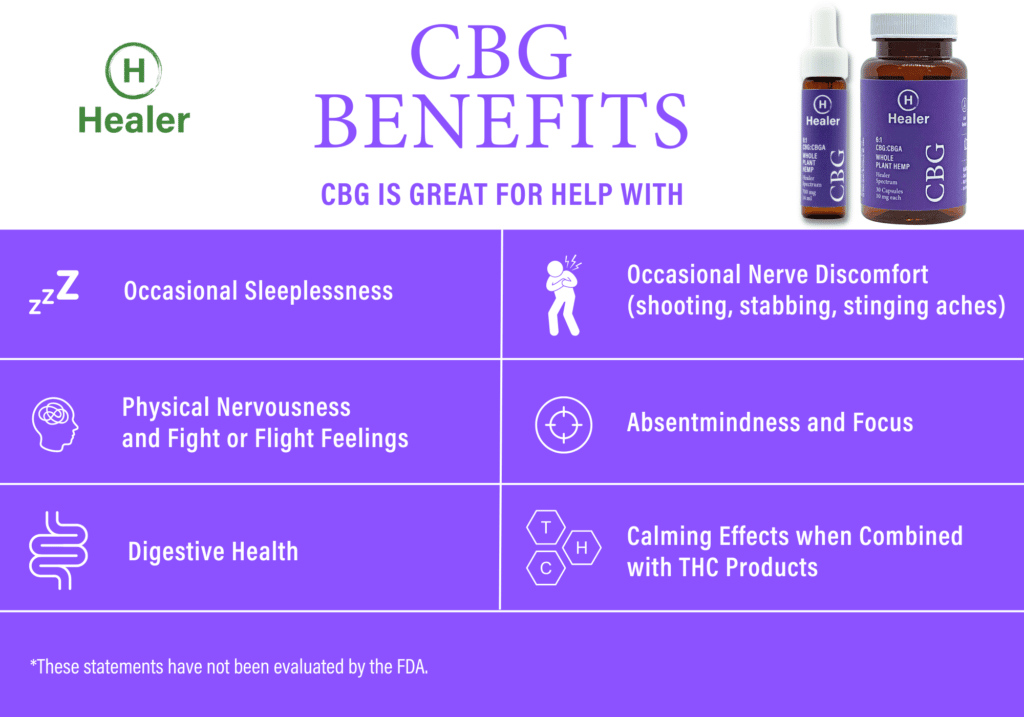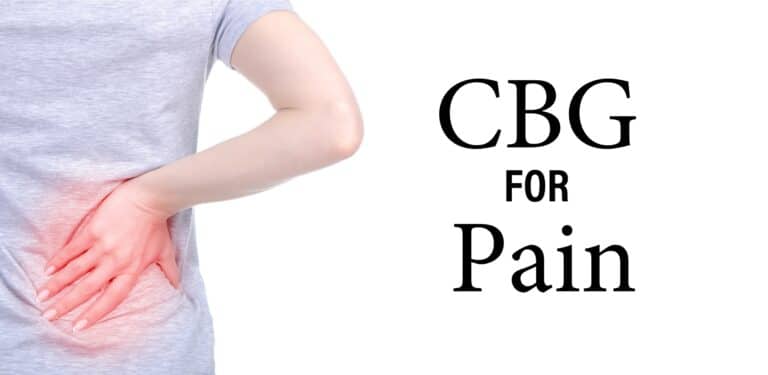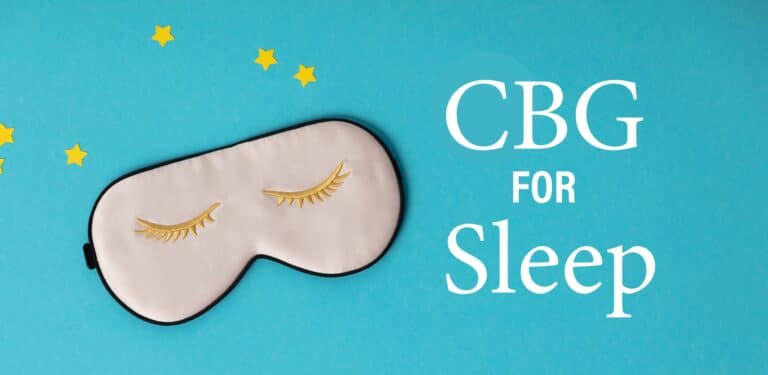CBG vs CBD: What’s The Difference?
Posted on April 5th, 2022 to CBG by Healer Staff Writer

First Off, What Is CBG?
Cannabigerol (CBG) is a cannabinoid best known for being “the mother of all cannabinoids” or “the stem cell cannabinoid”. CBG’s original, unheated form is cannabigerolic acid (CBGA). Over time or when heated (decarboxylated), CBG transforms into THCA, CBDA, or CBCA.
CBG shares some overlapping features with the better known cannabinoids like THC, CBD and CBDA, but it also has its own distinct properties. In this post we will discuss how CBG differs from its better known counter part, CBD.
What is the difference between CBG & CBD?
When it comes to the benefits & effects of CBG vs CBD, early indicators suggest that:
- CBG is more calming and relaxing when compared to CBD
- CBG may be more effective for aches and discomfort not addressed by CBD
- CBG may be more potent at lower usage amounts and is unlikely to diminish the effects of THC, especially when compared to CBD
Furthermore, several of CBG’s interactions with the body are quite different from those of CBD, CBDA and THC. These differences may make CBG particularly effective for people who have been disappointed by CBD or CBDA’s effects.
While CBD and CBDA appear to reduce worry & nervousness and improve stress response by stimulating the 5-HT1A serotonin receptor, CBG appears to have the opposite effect on these receptors.
This implies that, while all three cannabinoids can help depending on one’s neurochemistry, some people will respond better to CBD or CBDA and others to CBG.
What is CBG Good For? Is CBG Effective For Aches and Discomfort?
CBG seems to have potential to help with worry, sleeplessness, but is CBG good for aches? CBG may be more effective for those who have had little to no success with CBD.
- CBG works well to calm and relax people especially if they are in a fight or flight mode or agitated, by directly activating the ɑ-2 adrenoceptor in the central nervous system, inhibiting sympathetic (fight or flight) nervous system activity
- CBG inhibits the uptake of the relaxing neurotransmitter GABA, another important mechanism involved in regulating worry, occasional sleeplessness and signaling for aches and discomfort.
- In preclinical studies, CBG was shown to have strong antibacterial activities compared to other cannabinoids. We’ll learn more about CBG’s potential as research progresses.
You should try CBG if you:
- Want a hemp product that promotes relaxation and helps occasional sleeplessness
- Have aches and discomfort not addressed using CBD or CBDA especially if they are occasional never discomfort.
- Want a product to help you calm your fight of flight responses
- Want to support digestive health
- Find CBD and/or CBDA to be too stimulating
- Want to enhance the benefits of THC
How to use CBG in combination with CBD and CBDA
It’s possible that adding large amounts of CBG to a successful CBD and CBDA regimen might reduce some of the advantages of CBD and CBDA, because there is some data showing that large amounts of CBG, due to their opposing effects on the serotonin pathway, may limit some of the advantages of CBD and CBDA.
For this reason, Dr. Sulak recommends you try taking CBG at least 4 hours apart from CBD and CBDA to learn how you respond to CBG.
However, CBDA is not likely to inhibit CBG’s effects and may enhance the benefits. And, one preclinical model showed that CBG can increase the absorption of CBDA [7], suggesting that CBDA products that contain even a small amount of CBG are likely to be more effective.
CBG vs CBN
CBG is considered the “Mother Cannabinoid” as it is derived from the plant’s initial cannabinoid precursor and is non-intoxicating. CBN, on the other hand, results from the oxidation of THC, and while it can be mildly intoxicating, it is less so than THC.
CBG may have potential benefits for aches, soreness, GI health, and worry, while CBN is often associated with drowsy effects, although research on its benefits is limited.
There are safety concerns regarding high levels of CBN, which can result from lab processes.
Overall, CBG appears safer and more extensively studied, making it a potential option for various health concerns, while caution is advised with CBN-dominant products due to potential unknown compounds from lab manipulation.
For more information
Keep reading and don’t forget to check out these additional resources:
- Watch Dr. Sulak’s Webinar on CBG
- Read Healer.com guide to CBG benefits
- Read HealerCBD.com CBG Dosage – How Much CBG Should I Take?
What are the benefits of CBG?
What are the actual health benefits of CBG? Can CBG help with sleeplessness, stress and nervousness and nerve discomfort? Here is everything you need to know about the benefits of CBG and its unheated precursor, CBGA, and how they can be used to help improve your health.
Similar to other cannabinoids, CBG has the potential to aid in helping a wide range of symptoms, including worry, nervousness, occasional sleeplessness, aches, occasional nerve discomfort, support digestive health and brain function. CBG may be helpful for mood, speech, worry and other symptoms [1].
Although human research on CBG benefits is limited, pre-clinical studies suggest that CBG may help support digestive health. Additionally, CBG has been found to be a powerful broad-spectrum plant compound that may help with antibiotic-resistant superbugs.
Relevant Scientific Research Regarding CBG’s Potential Promise*
Nerve discomfort such as shooting, stabbing and stinging aches
CBG was shown to be far more effective than THC and aspirin in one rodent study [2].
GI Support
According to a 2013 study on mice, CBG appears to lessen the inflamed area in the gut [3].
*This information is not intended to diagnose, treat, cure or prevent any disease. It is being shared for educational purposes and is not a substitute for or alternative to information from your healthcare providers.
CBG Dosage Guide
The key to getting the best outcomes with CBG is to use the right amount that’s suited to your specific needs. Therefore, to get the most out of CBG (and other cannabis products), you’ll need to figure out what your optimal amount is and how often you should take it. This guide is for CBG oil, but if you’re interested in dosing for CBG capsules, the recommendations don’t differ.
- Start with 5 mg (5 drops) twice a day and work your way up to 40 mg each dosage if necessary. Most customers notice the effects right away within the first week and that the advantages grew throughout the first 30 days of regular use.
- If you’re currently using CBD or CBDA to promote better wellness and want to see how CBG stacks up, try CBG products at least 4 hours apart from your CBD or CBDA doses to see how you react. After you’ve figured out how CBG affects you on its own, combine CBG, CBD, and CBDA in a regimen that works best for you Learn more about how CBG interacts with other medications.
- Start with CBG oil drops placed under the tongue. Some of the oil will be absorbed quickly into your blood through the capillaries in your mouth, leading to faster relief, while the remainder will be digested and provide a delayed effect.
- Consuming CBG by this method enables the fine tuning necessary to find your optimal amount. This is especially true when using healer brand drops, which are formulated so that 1 drop is equal to about 1 mg of cannabinoids. For this reason, drops are the most cost-effective method of administration.
- When CBG drops, such as Healer’s 6:1 CBG:CBGA, are taken with a fat-containing meal or snack, absorption is increased, making the therapy more effective and less costly.
View the full CBG Dosage Guide
References
- [1] Karler R., Turkanis S. A. (1979). in Marihuana Biological Effects: Analysis, Metabolism, Cellular Responses, Reproduction and Brain, eds Nahas G. G., Paton W. D. M. (Oxford, UK: Pergamon Press; ), 619–641.
- [2] Formukong, E. A., A. T. Evans, and F. J. Evans. 12.4 (1988): 361-371.
- [3] Borrelli, Francesca, et al. Biochemical pharmacology 85.9 (2013): 1306-1316.
- [4] Colasanti, Brenda K., Charles R. Craig, and R. David Allara. Experimental eye research 39.3 (1984): 251-259.
- [5] Baram, Liran, et al. Oncotarget 10.41 (2019): 4091.
- [6] Reviewed in Nachnani, Rahul, Wesley M. Raup-Konsavage, and Kent E. Vrana. Journal of Pharmacology and Experimental Therapeutics 376.2 (2021): 204-212.
- [7] Anderson, Lyndsey L., et al. “Cannabis constituents interact at the drug efflux pump BCRP to markedly increase plasma cannabidiolic acid concentrations.” Scientific reports 11.1 (2021): 1-14.



